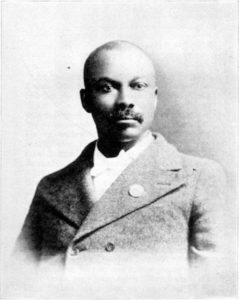
Joseph A. Booker
*Joseph Booker was born on this date in 1859. He was a Black editor, educator, minister, and community leader.
Born a slave in Old Portland, east of modern Arkansas, Joseph Albert Booker was the son of Albert and Mary (Punchardt) Booker, who were slaves on the large Bayou Bartholomew plantation of John P. Fisher. Booker’s mother died shortly after his birth. According to one source, when Booker was three, his father, a man with “some knowledge of books,” died when his slave master whipped him to death for urging his fellow slaves to revolt by “teaching them to read.” At the end of the American Civil War, Booker, then a child, was placed in the care of his maternal grandmother, Emma Fisher. Even at this early age, he showed a remarkable aptitude. With the opening of public schools, he was one of the first pupils enrolled.
Despite the difficulty Blacks had obtaining an education, Booker studied at every school within his reach in Ashley County. At seventeen, he was a teacher on the Harris plantation in Ashley County. At about the same time, he became licensed to preach as a Baptist minister. From 1878 until 1881, he attended Branch Normal College, now the University of Arkansas at Pine Bluff (UAPB) in Jefferson County. Here, he came under the tutelage of Professor Joseph C. Corbin. In 1881, Booker moved to Nashville, Tennessee, to attend Roger Williams University, enrolling in the “classic course.” He graduated from that institution with a bachelor’s degree in 1886.
He returned to his home in south Arkansas and turned his attention to full-time preaching. He soon received an appointment as State Missionary for the Arkansas Negro Baptist Convention and the American Baptist Home Missionary Society. He was ordained as a Baptist minister by the “No. 2” Baptist Church in Portland on August 22, 1886. Within the year, he was chosen as the first president of the newly established Arkansas Baptist College in Little Rock (Pulaski County), a position he would hold until his death. At the same time, he began a long tenure as editor of the state’s Black Baptist newspaper, the Baptist Vanguard, published in Little Rock. In June 1887, he married Mary Jane Caver. The couple had eight children.
Booker undertook his new tasks with such spirit and determination that, before long, he became widely known for “his industry and culture” throughout the community. In 1891, he was one of the leaders in the black community’s opposition to the “separate coach” law. Throughout his life, he was one of the state’s strongest advocates for Black citizens’ “self-help” education. At the same time, he worked tirelessly to foster a “spirit of goodwill” within the Black community toward the white establishment. He worked with Booker T. Washington to further these goals and often hosted him when he visited Little Rock. From 1911 to 1913, he served on the Little Rock “Colored Vice Commission,” which sought to clean up Little Rock’s notorious red-light districts.
In 1919, shortly after the outbreak of the Elaine Race Riot in eastern Arkansas, Booker accepted an appointment by Governor Charles H. Brough to the Arkansas Commission on Race Relations. Although more militant Black leaders criticized his lack of activism, Booker used his position on the commission to promote “interracial justice” for all of the state’s citizens. Early in September of 1926, Booker, seemingly in good health, left Little Rock to attend the National Baptist Convention in Fort Worth, Texas. On September 9, 1926, he was suddenly stricken with a heart attack and died within a few minutes. His body was returned to Little Rock, and he was buried in the Haven of Rest Cemetery.